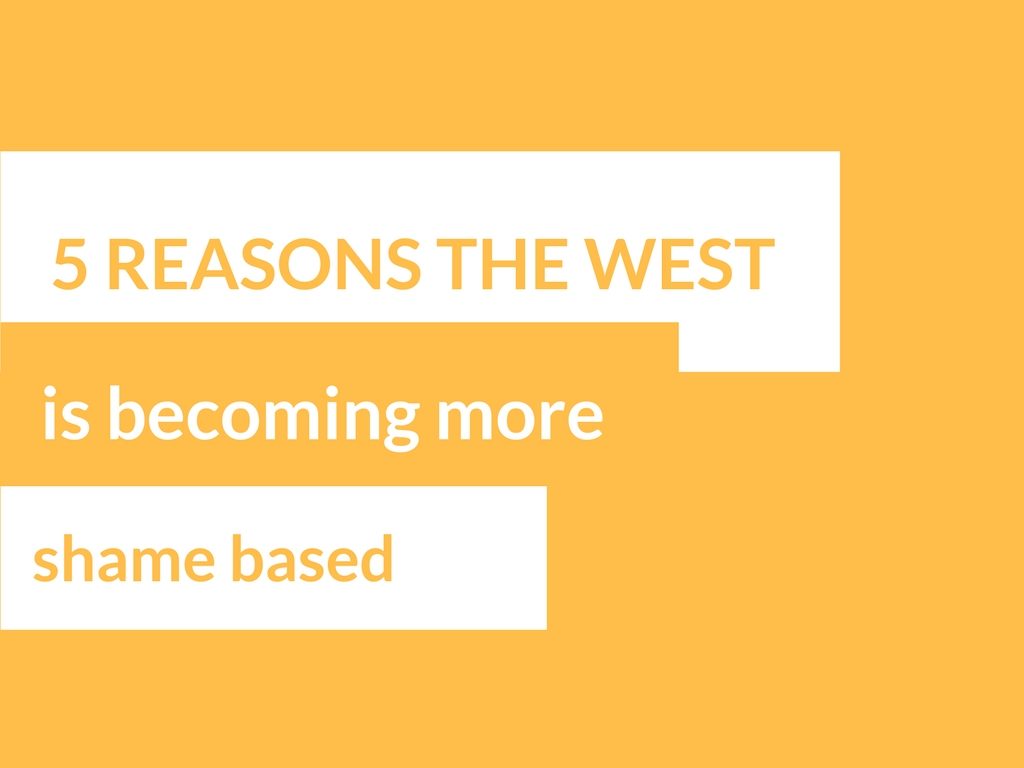5 Reasons the West is Becoming More Shame Based
“Young people these days are becoming more shame based.” The previous post showed how data from TheCultureTest.com collaborates this common observation. But this observation naturally evokes the “why?” question. Why is Western culture becoming more shame based? Here I identify are five factors.
- Multiculturalism. Since 1965 most immigrants have been from non-European background, especially Latin America and Asia. In 2010, forty million people in American were foreign born. So, the face of America is no longer white. New cultures introduce new values, such as honor and shame, into the melting pot. Whether through personal relationships or popular media, Americans today encounter people from honor-shame cultures more frequently than in previous decades. The migration of honor-shame cultures into the West would naturally impact Western culture and morality.
- Postmodernism has transformed our perception of knowledge and morality in the 20th century. Postmodernists look upon ideologies, truth claims, and narratives with skepticism and distrust. Postmodernism deconstructs “laws” and “rules” as dominating and oppressive cultural systems. When people view moral codes as culturally relative or politically motivated, then their conscience does not feel “guilty” for transgressing moral codes. Moral relativity undermines notions of absolute guilt or moral standards.
Public confidence in the American justice system and law enforcement has been undermined by recent attention on videos of police brutality and documentaries like O.J.: Made in America or 13th. This attention leads to guilt by association—all notions of law, including biblical commandments, are viewed with suspicion and relativized.
- Civil Rights Movements have employed shame to influence public policy. For example, Martin Luther King, Jr. sought to expose the moral hypocrisy of Southern leaders during the civil rights movement. He wanted people to see the images of white police harming Negros, because that would undermine the moral credibility of segregationists. The civil rights movement shamed shameful racism by exposing the immorality of Jim Crow laws.
More recently, the lesbian, bisexual, gay, transgender (LBGT) community has used shame to spur political and social change. The pride movement has labeled acts of intolerance as shameful. People who do not accept the sexual orientation of others are denounced as “bigots” and “homophobes.” With many Americans in favor of LBGT rights, people increasingly experience a greater sense of shame (both personally and publicly) for such “intolerance” and “exclusion.”
- Identity Politics gets people to support policies based on the interests of their social group. Identity politics creates tribalism—people supporting “their person” simply because he will help “us.” Though many people denounce identity politics as divisive, history proves it is a strategic tool for rallying the masses and getting power.
Donald Trump embodies identity politics (as have liberals). His campaign platform invigorated white nationalism. The tribe of white evangelicals by in large supported him as well. The tribalism of identity politics is about securing honor for your own clan and diminishing the status of outsiders; the tribalism of identity politics is not about moral rightness or the innate merit of public policies.
- Social Media creates an ever-present digital community before whom we must manage our face. Social media extends Satan’s oldest lie—we are what others think we are, not who God made us to be—into more of our life. To cover their shame, people project a “face,” get new “friends,” build “community,” or “make a name for ourselves” (Gen 11:4), and even degrade others. Lives have been ruined by the outrageous shaming ploys of internet bullying or Twitter takedowns. Through social media we experience new levels of humiliation in the court of public opinion. The dawn of social media has introduced new sources of shame in our lives.
These five realities have introduced shame into American culture, for both good and bad. These contribute to the general shift away from guilt and toward shame in Western morality.
What Will the Future Hold?
I suspect these factors–multiculturalism, postmodernism, civil/human rights movements, identity politics, and social media–will only become more prominent in Western culture. If that hypothesis proves true, the need for explaining the gospel as release from shame (both objective and subjective) will become more missiologically strategic for ministry in the West.
What do you think—why is the West become more shame-prone?


Have you seen this discussion by Rabbi Jonathan Sacks? http://rabbisacks.org/the-power-of-shame-metsorah-5776/
I’m sure a point of stress and confusion is that our age’s expressive individualism LOOKS like it would push people apart into non-conformity, whereas what we actually see is increased conformity and tribalism. I’m tempted to see both features – the increasing expressive individualism and turn toward shaming – as strategies of power, not merely cultural features.
Number 5 seems to be driving number 4 in some very key ways. The fear that the internet would isolate us has not come true. What has come true is this push towards tribalism and belonging around certain ideas or identities (eg. include gamers and fans of specific content producers).
HonorShame cultures function well on a bedrock of strong relational ties and relational identity. The hybrid arising now is missing that support system and may leave young people even more isolated and lonely. They need our help.